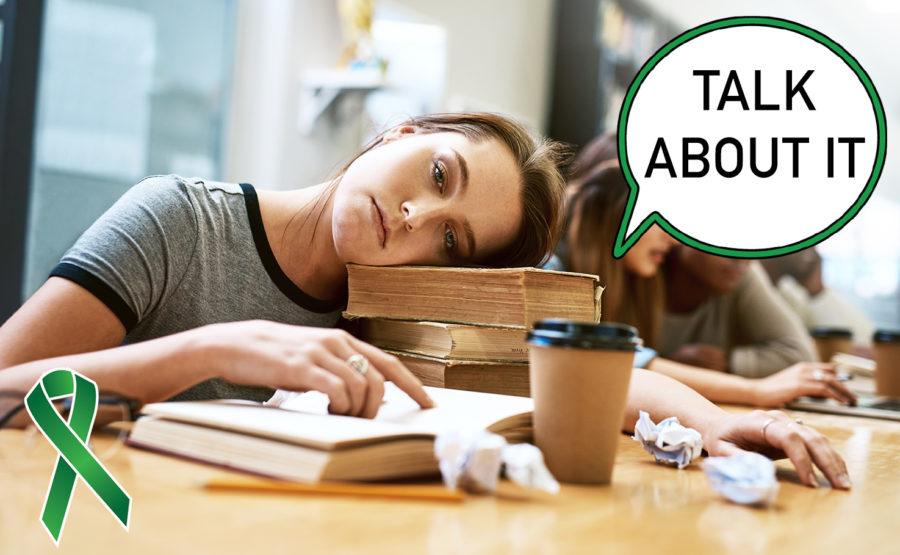Talk About It: Burnout
Photo from Getty Images Design by Brooklyn Williams
As the semester wraps up, overwhelmed college students may experience burnout. Some symptoms include feeling drained or defeated or changing eating and sleeping habits.
December 12, 2019
Toward the end of the semester, college students may feel like everything is falling apart. That feeling is burnout.
According to helpguide.org, burnout is a state of emotional, physical and mental exhaustion caused by extreme amounts of stress.
This feeling happens when someone feels overwhelmed, emotionally drained and unable to meet constant demands. As the stress continues, they begin to lose interest and motivation that led them to take on a certain role, like being a student, in the first place.
Carrie Giese is the Prevention and Health Promotion coordinator at Iowa State and program coordinator for Student Wellness.
Giese said burnout can be caused by the multiple demands being made in individuals’ lives and can lead to fatigue toward the end of the semester. She also put emphasis on the idea that college students are often surrounded by other people going through similar stressors, which can lead to varying emotions as well.
“Often the folks people are surrounded by, like their support system, are going through the same thing, so it’s kind of like emotional hot potato,” Giese said. “It’s a back and forth, where you are sharing the stress with the people you’re surrounded by, rather than purging it.”
Burnout is a gradual process, which can be caused by many different things. The signs and symptoms are subtle at first but become worse as time goes on. Help Guide suggests if someone pays attention and actively reduces their stress, they can prevent a major breakdown. If they ignore them, they’ll eventually burn out.
Help Guide identifies symptoms of burnout.
Physical symptoms may include feeling tired and drained most of the time, lowered immunity, frequent illnesses, frequent headaches or muscle pain and change in appetite or sleep habits.
Emotional symptoms are a sense of failure and self-doubt, feeling defeated, an increasingly cynical and negative outlook, detachment and a loss of motivation.
Some common behaviors of burnout are withdrawing from responsibilities, isolating themselves from others, procrastinating, taking longer to get things done, using drugs or alcohol to cope, taking out frustrations on others, skipping work or coming in late and leaving early.
Giese said culture is a factor in burnout, too, and how stereotypes can cause misinterpretations of symptoms and behaviors and can lead to normalizing them as well.
“This is what everyone says the end of the semester is supposed to feel like,” Giese said. “It’s like a badge of honor or courage to not have slept for three days or to have drank five gallons of coffee. They’re trying to get a status based off of work ethic, when work ethic really has nothing to do with self-care or burnout prevention. It feeds the fire of the end of the semester stereotype.”
Some prevention measures are just acknowledging one’s basic human needs, Giese said. She said keeping up with sleep, keeping up a good diet, keeping up with hygiene, socializing and being within a community are some self care preventatives involved in burnout.
Giese also said the idea of time management and mindfulness can help prevent burnout too. She said by using time wisely and putting full thoughts coherently together, it’s easier to prevent the extreme side effects like stress that can ultimately lead to burnout.
There are many resources for students to use when dealing with burnout, Giese said.
“Student Counseling Services is a great resource for folks where they can have a walk-in session,” Giese said. “There is also ‘Let’s Talk’ sessions at Memorial Union, and they can participate at the Biofeedback Center throughout the year.”
The Student Wellness Center provides information of keeping up good hygiene, good sleep schedules and dieting measures.
There is also Network Community Counseling Services, which is located on the basement floor of Science Hall 1, room 56, which is in the southeast corner of the building. In this room they offer low-cost individual and group counseling for those who are 18 years and older.
Students can also find report forms through the Dean of Students Office website.
There also are crisis resources available to utilize, such as:
Central Iowa Crisis Line: 844-258-8858
National Suicide/Crisis Line: 800-273-8255
The Trevor Project: 866-488-7386
Iowa State Police Department: 515-294-4428
Student Counseling Services: 515-294-5056
Mary Greeley Medical Center: 515-239-2011
Student Assistance: 515-294-1020

















